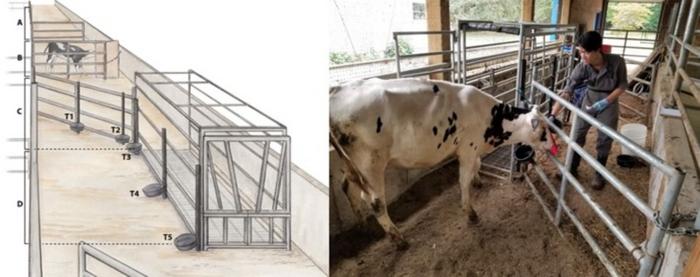Philadelphia, March 14, 2024 – Dairy cows receive a huge amount of care during their lives on a farm, but procedures, especially restraining during procedures, can be stressful for some animals. Positive reinforcement training—or training with a reward to achieve a desired behavior—has shown promise to reduce this fear in other species. In a recent study in the Journal of Dairy Science, published by the American Dairy Science Association and Elsevier, a team of researchers set out to understand whether this training technique holds promise for cattle as well. They demonstrated that it not only helps shape dairy cow behavior but can improve their emotional state and overall welfare along the way.

Credit: University of British Columbia
Philadelphia, March 14, 2024 – Dairy cows receive a huge amount of care during their lives on a farm, but procedures, especially restraining during procedures, can be stressful for some animals. Positive reinforcement training—or training with a reward to achieve a desired behavior—has shown promise to reduce this fear in other species. In a recent study in the Journal of Dairy Science, published by the American Dairy Science Association and Elsevier, a team of researchers set out to understand whether this training technique holds promise for cattle as well. They demonstrated that it not only helps shape dairy cow behavior but can improve their emotional state and overall welfare along the way.
Jennifer Heinsius, PhD student in the Faculty of Land and Food Systems, Animal Welfare Program, University of British Columbia, explained, “A growing body of research shows that training with positive reinforcement enhances animal welfare.”
Opportunities to learn can reduce distress responses to procedures such as veterinary care, reduce the risk of injury, and help animals feel comfortable with new stimuli.
Heinsius noted, “As yet, very little of this research has been devoted to farm animals, so we set out to test the effects of training dairy cows with positive reinforcement in a cattle chute—a common experience for dairy cows undergoing veterinary care or husbandry.”
The team started with a group of 20 Holstein dairy heifers ranging from three to six months old, who had previous experience in the cattle chute area and with human handling. The animals were randomly assigned to either a group receiving positive reinforcement training or a control group receiving standard farm handling in the chute. The study involved 28 training sessions for each animal over four days a week with one session per day. Heifers were first brought to a waiting area (“start box”) and were then allowed to enter the training area, where they had access to the chute.
For the training group, grain was used as a food reinforcement to progress through the stages. Heifers were trained to touch a target with their muzzle; this target was then gradually moved until the animals were fully entering the chute.
Control heifers were also familiarized with the same chute but were not provided a food reward and were instead guided by a handler using words of encouragement, calm body movements, and gentle nudging to prevent them from backing up.
To assess how these two groups of animals perceived their experience, the researchers recorded anticipatory and play behaviors during the period when the heifers were waiting in the start box before entering the training area to start their daily training session.
Heinsius explained, “Overall, the dairy heifers trained with positive reinforcement showed more anticipatory behaviors in the start box than the control group; specifically, they transitioned between behaviors more frequently, indicating they were anticipating the start of their training sessions and the food reward.”
The training group also displayed more play behavior, such as jumping and running, indicating that the animals considered the training experience to be positive.
Heinsius elaborated, “Critically, the increases in play behaviors suggest that positive reinforcement training had a positive effect on the animals’ emotional state before handling, and to our knowledge this study is the first to assess the effect of training on emotional states in cattle.”
The study team stressed the need for further research—such as the long-term benefits of the training—and underscored the practical limitations attached to the time investment required to teach and train individual cows.
Heinsius outlined, “We hope to see future work to improve the efficiency of training methods and working with cattle earlier in life. And promising automated approaches might be developed using existing on-farm automation such as computerized feeders.”
Overall, this initial study is a first step to understanding the effectiveness of training heifers using positive reinforcement, and the results suggest it could be an important tool to help relieve stress and fear during important on-farm events in a dairy cow’s life—potentially improving the experience for both the animals and their handlers.
Journal
Journal of Dairy Science
DOI
10.3168/jds.2023-23709
Method of Research
Experimental study
Subject of Research
Animals
Article Title
Training dairy heifers with positive reinforcement: Effects on anticipatory behavior




